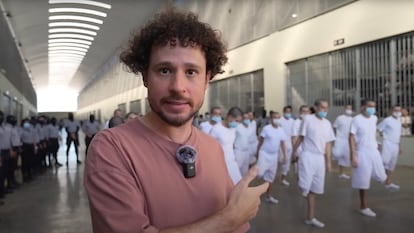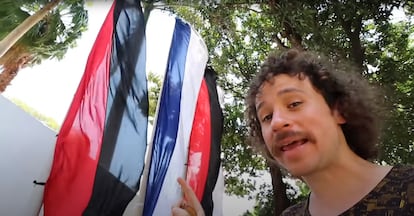Frivolizing Bukele’s ‘Alcatraz’: Luisito Comunica’s latest controversy
Experts question the lack of ethics and transparency in the content produced by the Mexican YouTuber and other influencers, warning that a large number of followers does not signal that someone is a trusted source


Fans of Luis Villar Sudek, better known as Luisito Comunica, have followed him on his trips around the world, where he explains each destination in detail. In 2012, he launched his own YouTube channel and since then, his popularity has soared. Between 2020 and 2023, he was the king of YouTubers in Mexico. Today, he has more than 42 million followers on the video platform.
But his career as a content creator has not been without controversy. The most recent scandal broke out as a result of his visit in El Salvador to the Centro de Confinamiento del Terrorismo (CECOT), the maximum security prison, where Salvadoran President Nayib Bukele plans to confine 40,000 gang members. On social media, Luisito Comunica has been accused of making pro-Bukele propaganda and, above all else, of dehumanizing the prisoners.
In the video, Luisito Comunica has unrestricted access to the facilities, and whole-heartedly justifies the prison conditions. “Seeing these images, it’s easy to be moved, to clutch your heart and say ‘wow, what harsh mistreatment there is inside the prison.’ But when you learn about the human atrocities they have committed, it all makes sense,” he says in one segment. The influencer assumes that all the inmates are guilty, despite the large number of allegations of arbitrary detentions and lack of due process in El Salvador.
Fernando Bustos, philosopher and cultural critic, argues it’s “wrong and to a certain extent dangerous that people with so much influence, with such a large audience, do not politically and socially question the things they say. We are living at a time when suddenly it seems as if your number of followers turns you into a kind of bearer of truth, of authority. These people [influencers] are protected by freedom of expression and therefore ‘we can say anything.’”
Julio Juárez Gámiz, a professor at the Center for Interdisciplinary Research in Sciences and Humanities of the National Autonomous University of Mexico (CEIICH-UNAM), says that content creators like Luisito Comunica produce what he calls “peripheral journalism”: they use the codes and narrative of traditional journalism, but without the deontological criteria of the profession.
“They are at the service of whoever hires them to position topics, angles, frames that favor their sponsors, although — this is where the most delicate issue comes in — the viewer does not know that certain content comes from a commercial agreement that, many times, is made behind the audience’s back. Users do not see it as the result of a commercial negotiation, but as the exercise of freedom of expression,” explains Juárez, who also specializes in political communication.
Luisito Comunica’s visit to CECOT took place in the context of the elections held in El Salvador a couple of weeks ago, in which Bukele — after eliminating the constitutional restrictions on reelection — won a second term with more than 80% support. Apart from content creators, the Salvadoran president also welcomed international media, such as EL PAÍS and the BBC, but did not grant them the same access or privileges that Comunica and other influencers were given.
Bukele, an expert in advertising and political marketing, has always known how to sell himself as an “anti-establishment” figure, far removed from the old guard of politics and traditional media. For this same reason, he uses YouTubers such as Luisito Comunica or figures such as Tucker Carlson, the controversial ultra-conservative U.S. journalist, as spokespersons.
“Bukele is a smart guy and he knows that what an influencer can say has more weight than what a journalist can say. Having articles written about me is of no value if I can just invite Luisito Comunica and with that, I kill or shut up everything else,” explains Bustos.
According to Juárez, the fact that this type of influencer is giving free rein to these kinds of messages helps legitimize Bukele, with content bordering on “dramatization” and “spectacularization.” “They are doing exactly the same reportage [Luisito Comunica and Lethal Crysis]. Many of the images you see are the same, these visual props, aerial shots of the prison that the very government of El Salvador provides them with. If you watch the video, it’s the same narrative: ‘We get to the prison, we see the prisoners, it looks sad, but there are people who deserve it.’ It should put into perspective what kind of journalism this is and what kind of interests are being served by this infotainment, which says I’m going to scare you, I’m going to show you these evil people who indeed deserve these punishments,” says the CEIICH-UNAM researcher.
Luisito Comunica, who in 2021 interviewed Bukele together with YouTuber Juan Bertheau, sparked an earlier controversy after he celebrated buying a seafront apartment at a bargain price in Venezuela, amid the country’s deep crisis. He was also questioned in 2019 for a video, involving his then girlfriend Cinthya Velázquez, in which he “joked” about sexually abusing her. “The truth is my goal is to make you really drunk and then abuse you a bit later,” he told the camera.
That same year he was questioned about his visit to Nicaragua, in a video titled The Country They Advised Me NEVER to Visit, given the reports of human rights violations in the country.
Bustos says there is a suspicion about how much content is paid for. “We only pay attention to what is presented to us in an entertaining way and of course there is a great danger. Just because something can be entertaining does not mean that the information is true,” the philosopher adds.

Juárez is convinced that these spokespersons are used to put on the agenda the issues that those in power have a vested interest in. “It would be very naive not to establish a relationship between one and the other [influencers and the people in power] when what has been demonstrated is that there is an impact and also a closeness,” he explains.
“It is very important to recognize this freedom of expression,” Juárez adds, “and to recognize platforms as an effective channel of communication. But we must also stay focused on the professional rigor with which this type of content is generated.”
Sign up for our weekly newsletter to get more English-language news coverage from EL PAÍS USA Edition
Tu suscripción se está usando en otro dispositivo
¿Quieres añadir otro usuario a tu suscripción?
Si continúas leyendo en este dispositivo, no se podrá leer en el otro.
FlechaTu suscripción se está usando en otro dispositivo y solo puedes acceder a EL PAÍS desde un dispositivo a la vez.
Si quieres compartir tu cuenta, cambia tu suscripción a la modalidad Premium, así podrás añadir otro usuario. Cada uno accederá con su propia cuenta de email, lo que os permitirá personalizar vuestra experiencia en EL PAÍS.
¿Tienes una suscripción de empresa? Accede aquí para contratar más cuentas.
En el caso de no saber quién está usando tu cuenta, te recomendamos cambiar tu contraseña aquí.
Si decides continuar compartiendo tu cuenta, este mensaje se mostrará en tu dispositivo y en el de la otra persona que está usando tu cuenta de forma indefinida, afectando a tu experiencia de lectura. Puedes consultar aquí los términos y condiciones de la suscripción digital.








































